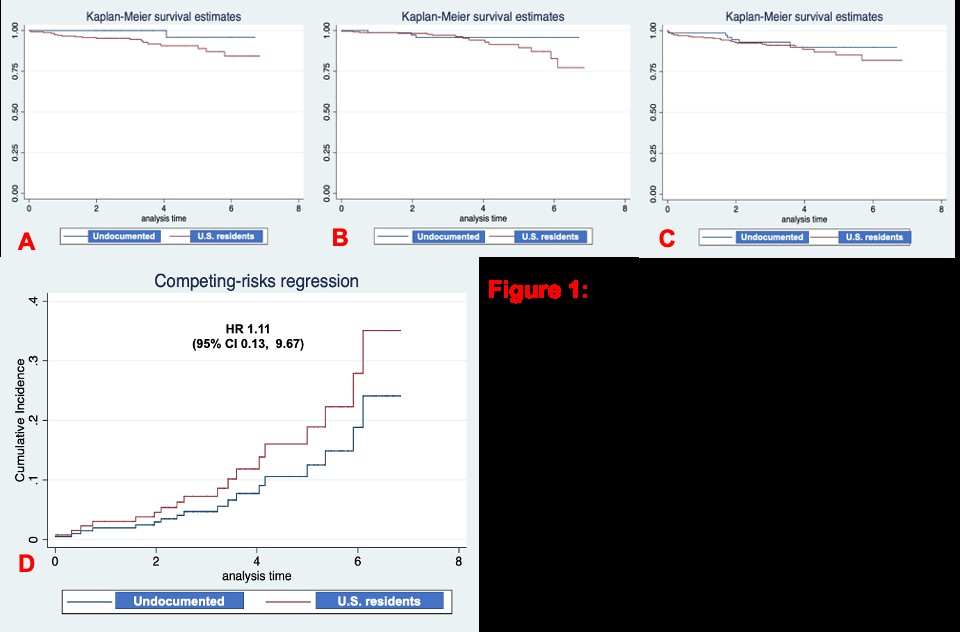Noninferiority Outcomes Among Undocumented Immigrant Kidney Transplant Recipients in California
H. Ichii1, N. Eguchi1, E. Tantisattamo2, U. Reddy2, A. Ferrey2, D. Dafoe1
1Surgery, University of California Irvine, Orange, CA, 2Medicine, University of California Irvine, Orange, CA
Meeting: 2021 American Transplant Congress
Abstract number: 389
Keywords: Ethics, Hispanic, Kidney transplantation, Renal function
Topic: Clinical Science » Ethics » Psychosocial and Treatment Adherence
Session Information
Session Name: A Penny for Your Thoughts: the Economics and Psychosocial Aspects of Transplant
Session Type: Rapid Fire Oral Abstract
Date: Tuesday, June 8, 2021
Session Time: 6:00pm-7:00pm
 Presentation Time: 6:35pm-6:40pm
Presentation Time: 6:35pm-6:40pm
Location: Virtual
*Purpose: There are over 2 million undocumented immigrants (UI) in California, where currently, all individuals regardless of immigration status have equal access to kidney transplant(KT). There is a medical perception that UI face a higher risk of transplant failure due to language barrier, and lack of access to immunosuppressive medication and healthcare. Whether these characteristics of the minority are associated with poorer transplant outcome In UI compared to those of the US residents(UR) is uncertain.
*Methods: A retrospective cohort study was conducted from a single transplant center during a 5-year study period. The study population was divided into UI and UR groups. All-cause mortality between the 2 groups was compared by using multiple Cox proportional hazard regression analysis. Other transplant outcomes including all-cause graft loss and acute rejection were examined by competing risks regressions with mortality and mortality plus graft loss serving as competing risks, respectively.
*Results: Of all 306 consecutive kidney transplant recipients (KTR), mean age±SD was 47±13 years old, 173 patients were male (57%) and 73 (24%) were UD. During a median follow-up time of 3.25 years (0.04, 6.84), only 1 UI and up to 19 UR died (incidence rate of 0.023 and 0.004 person-years, respectively). Compared to the UI group, US group had no statistically significant increase in risk of all-cause mortality after adjusted for factors potentially contributing to KT outcomes (adjusted HR 5.33, p 0.153, 95% CI 0.54, 52.90, Figure 1A). The direction of the association between U.S. residential status and graft loss as well as rejection were the same as those of the mortality but the magnitudes were lower and remained non-statistically significant (s-HRgraft loss 1.42, p 0.60, 95%CI 0.38, 5.33 and s-HRrejection 1.60, p 0.308, 95%CI 0.65, 3.94, Figure 1B&1C). Moreover, among 43 KTR receiving the 2nd KT, the UR group had 11% greater the risk for all-cause graft loss compared to the UI group but no statistical significance (HR 1.11, p 0.925, 95% CI 0.13, 9.67; Figure 1D).
*Conclusions: The KT outcomes of the UI are not inferior to those of the UR; however, the UI have long been a minority in KT in the US. Transplant community and involved stakeholders may consider revisiting organ allocation policy to mitigate this disparity.
To cite this abstract in AMA style:
Ichii H, Eguchi N, Tantisattamo E, Reddy U, Ferrey A, Dafoe D. Noninferiority Outcomes Among Undocumented Immigrant Kidney Transplant Recipients in California [abstract]. Am J Transplant. 2021; 21 (suppl 3). https://atcmeetingabstracts.com/abstract/noninferiority-outcomes-among-undocumented-immigrant-kidney-transplant-recipients-in-california/. Accessed February 19, 2026.« Back to 2021 American Transplant Congress

